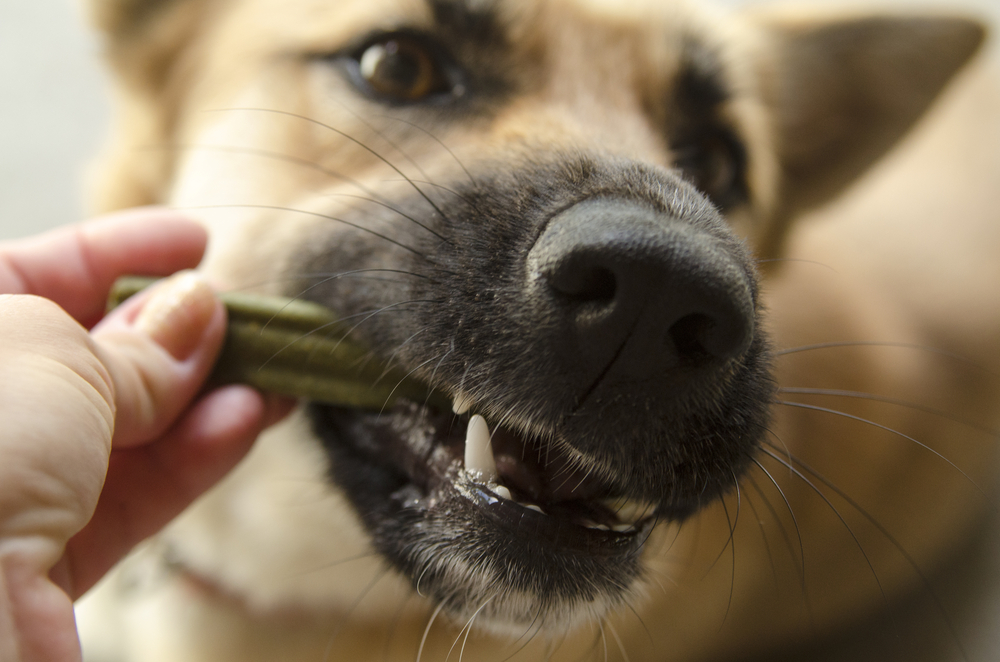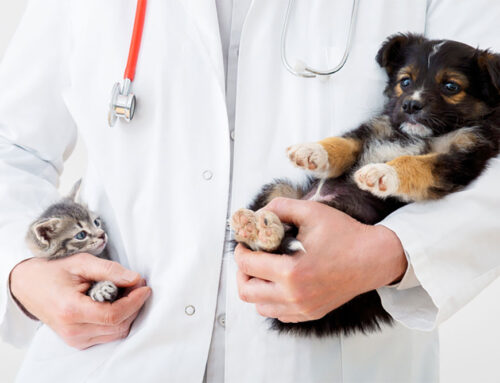Pet owners spend a lot of money on their pets—from treats, to toys, to specialty diets. In fact, pet care is a multi-billion industry, which testifies to our love for our four-legged companions. However, pet dental care often gets the short end of the (throwing) stick. Most pets have an 80% to 90% chance of developing periodontal (i.e., dental) disease by age 3, yet their dental care is often overlooked, despite its effect on their overall wellbeing.
Our Midtown Veterinary Hospital team is celebrating National Pet Dental Health Month by focusing our attention on periodontal disease and its prevention.
Periodontal disease in pets
Your pet’s smile is probably one of the things you love most. Healthy teeth and gums are necessary not only for a pet’s dental health but also overall wellness. Periodontal disease results when bacteria in the mouth form plaque that hardens to tough tartar. During the cycle of plaque buildup and tartar development, the accumulated bacteria damage the tooth structures and can, over time, cause systemic problems and enter the bloodstream and damage the heart, kidneys, and liver. All this damage can also shorten the life of affected pets.
Signs and stages of dental disease in pets
Many pets do not show dental disease signs until the condition has advanced. Unfortunately, many pet owners do not check their pets’ mouth, and if they do notice foul or unpleasant breath, which is often the first obvious sign, they dismiss the odor as normal.
First periodontitis signs may include:
- Halitosis (i.e., bad breath)
- Inflammation or redness of the gums
- Difficulty chewing
- Favoring one side of the mouth while chewing
- Discolored (i.e., brown or yellow) teeth
- Weight loss
- Loss of appetite
- Nasal discharge
- Pawing at the mouth
- Excessive drooling
- Loose or missing teeth
Be alert to these signs, and contact Midtown Veterinary Hospital promptly. We will examine your pet thoroughly, and if we diagnose periodontal disease, we will assess the disease stage to determine treatment. The four stages of periodontal disease are:
Stage 1 — This early stage is characterized by gingivitis, with gum inflammation and plaque and tartar buildup.
Stage 2 — At stage 2, the disease is considered early periodontitis and indicated by foul breath, gum inflammation, plaque and tartar development. Treatment at this stage involves a thorough dental cleaning to prevent disease progression.
Stage 3 — At this more serious stage, 25% to 50% of bone is lost and gums will be inflamed and bleeding. Teeth extractions are often required and infection is controlled with the use of antibiotics.
Stage 4 — Considered advanced or severe, stage 4 periodontitis involves more than 50% of bone loss, possible abscesses, infection, and damage to the supportive tissues that surround the teeth. At this stage, periodontitis may have already impacted other body organs and is considered an emergency.
Treatment and at-home recommendations

The veterinarian’s oral assessment during your pet’s regular wellness exam is crucial to detect changes to the teeth and gums, which will determine your pet’s treatment. Dental cleanings are essential for good oral health, and we recommend them yearly or twice yearly, starting at 1 year of age for cats and small-breed dogs, and 2 years of age for large dogs.
Depending on disease severity, our veterinary team will perform a regular teeth cleaning and tooth extractions as needed. Dental cleanings must be performed on anesthetized pets for the comfort and safety of the pet and the safety of the veterinary team. Treatment is a complex process, and we use sharp dental instruments to scale and polish the teeth. Digital dental X-rays are also needed and require the pet to be completely still.
Prevention also includes at-home dental care, such as daily toothbrushing and food and treats specially formulated for dental health. Our team can assist if you are nervous about toothbrushing with a demonstration during your pet’s wellness exam.
Regular dental care is the best tool for prevention of periodontal disease and its complications. Our Midtown Veterinary Hospital team offers a wide variety of dental services and treatments that help ensure your pet enjoys optimal health. Call us to schedule your pet’s wellness and dental exams.





Leave A Comment